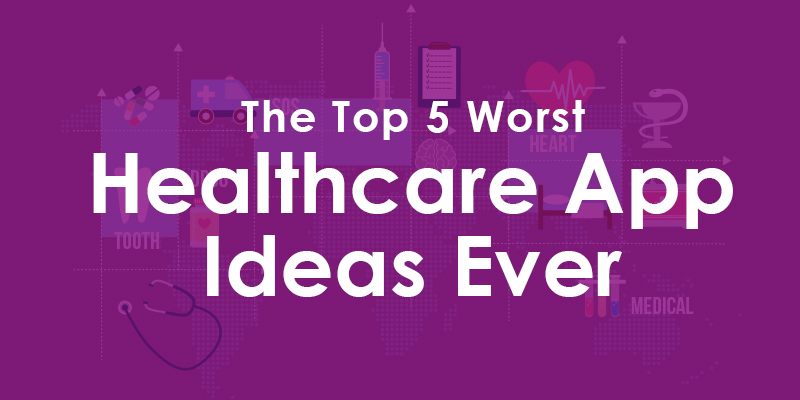We’ve got to admit, there’s been some tremendous advances in the healthcare mobile apps sector. Medical apps help us stay fit, find the nearest hospital in case of emergency, allow us to remotely monitor our vitals and a lot more. They’ve simplified our complex healthcare routine and made it not only accessible, but also affordable.
Sadly, though, the healthcare mobile app industry isn’t completely awesome – Actually, there have been some really terrible app ideas that were 100% not useful and completely fraudulent.
So, our healthcare app developers have put together the “best of the worst” healthcare app list! Here are 5 of the worst healthcare app ideas that should have never been implemented. Read, learn and don’t repeat. That’s the doctor’s orders.
Apps That Promote Your Phone’s Flashlight As A Miracle Worker
Mobile apps can do many things, but they surely can’t use their flashlight or speaker to cure medical issues. A certain acne app was fined by the FTC for telling customers to use the flashlight through their app for 10 minutes every day, promising it would cure all their acne problems. The fact is that even if there were a device that could do this, it would most assuredly not be your smartphone’s flashlight. Another app in the market also claimed to measure oxygen level in the blood with the help of the flashlight, which is impossible without the use of infrared rays.
Lesson Learned: It’s not wise to go ahead with an idea just because it looks good on paper. Proper testing should be enforced to check if your app functions the same way it should and claims. It’s the only essential element of your app’s long term success.

Apps That Help In The Diagnosis Process Without An External Device
Mobile apps are now claiming to measure people’s vitals with only the use of a phone. Such ideas are basically bogus claims, since the smartphone, by itself, doesn’t have the required meters or sensors to measure the blood pressure, pulse rate, blood glucose level… Or anything for that matter. Your phone’s really good at measuring your 4G data usage – Not oxygen intake.
A certain medical app claimed to measure people’s blood pressure without any connected device. The app didn’t have a disclaimer that their results could be inaccurate and should not be used for serious medical conditions. Only after a doctor pointed out the inaccurate numbers in the app, the developers put up a disclaimer. The app was quite popular in the market and priced at $3.99. Looking at the number of downloads and comments, it showed that many innocent users were using it regularly. This practice can sometimes lead to serious problems to innocent users.
Lesson Learned: The smartphone alone is not enough – In order to get any reliable data, you must have additional hardware to make your app a success. Additionally, you can sell the hardware through your app and open up new revenue streams!

Apps That Help You See Better
There are laser surgeries, glasses and contact lenses that can help you see better, but definitely not a smartphone. Recently, an app claimed that it can help users see better and was fined heavily by the FTC. They marketed their product stating that their app is based on “scientific research” and could definitely improve user’s eyesight.
Lesson Learned: Medical app claims need to be backed up by real scientific and pier reviewed evidence, not just “research” reports.
Apps That Detect Cancer
Cancer is no joke. Period. Fact: Mobile apps can’t accurately detect cancer. Period. However, one company patented their app algorithm stating that it could do just that. Users would upload a mole’s picture and the app would predict if the mole had characteristics and symptoms of melanoma.
Lesson Learned: There are some diseases which are best analyzed by professionals and not a computer algorithm. Sometimes you shouldn’t try to replace the professionals, especially when life is at stake.

Apps That Promise The World But Deliver Nothing
As the mobile healthcare industry booms, app developers are looking to make it big with poor apps that fail to live up to their expressed expectations. There are healthcare mobile apps built to improve user’s brain activity, stress test your fitness level and other far-fetched ideas that simply aren’t true.The problems arise when the app is built on just ideas and not concrete proof. Once the app is built, then the marketing messages are so far-fetched that their messaging eventually leads to their downfall.
Lesson Learned: Healthcare mobile app developers should be responsible and build reliable products. If you fail to follow this simple principle, you will end up putting people’s lives at risk, along with ruining your reputation.
There are over 165,000 healthcare mobile apps in the market and trying to come up with unique ideas might prove to be tough. To be successful, your healthcare mobile app should be pro-user – AKA developing a concrete product that actually helps people. Do you have a healthcare mobile app idea? Talk to our healthcare app developers today!

